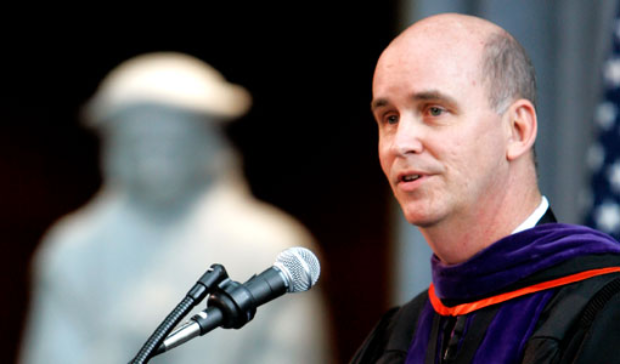PERSPECTIVE IS ONE OF THE FIRST THINGS LOST IN THE MIDST OF A CRISIS. The current economic crisis demonstrates this, with news changing by the hour, going from scandal to bailout to government intervention. With blogs, television reports and newspaper stories, it can feel as if we are adrift in an ocean of information.Lyman Johnson and Thomas Abood are uniquely positioned to provide perspective in the current financial crisis. Both have watched the changes in the business environment and financial markets with a long-term perspective.
Professor Johnson is the Laurence and Jean LeJeune Distinguished Chair in Law at the School of Law. He is an expert on corporate law and securities law, his primary teaching areas. He has written more than 30 articles on corporate governance and securities law issues. Johnson often speaks at academic and legal conferences; he has been quoted in the New York Times, The Wall Street Journal, and other newspapers, and he is a frequent consultant or expert witness on corporate law matters and securities fraud litigation.
Abood, a member of the School of Law’s Board of Governors, is executive vice president, general counsel and secretary of Dougherty Financial Group L.L.C. He oversees DFG’s investment management businesses and supervises its legal/compliance and human resources departments. Prior to joining DFG in 1994, Abood was an associate with Skadden, Arps, Slate, Meagher and Flom L.L.P. for six years.
St. Thomas Lawyer talked to them in November about the role of government and lawyers in these financially challenging times.
What is the one thing you would want policymakers to understand before they react to the current financial crisis?
Thomas Abood: I’d like them to take the long view. Things will get better in the long run and I think they need to temper their desire for short-term relief with the knowledge that things will get better, and there can be damage from some of their policymaking measures.
Lyman Johnson: One thing that I would highlight for them to remember is that how they talk about problems can be as important as what is said. Of course we want candor about our problems but the careless use of alarmist language in an effort to persuade others to ones’ views can itself exacerbate those problems. Looking back to mid-September, perhaps Treasury Secretary Henry Paulson and Federal Reserve Chairman Ben Bernanke might have done that.
Our country has been tried mightily in the past and we have surmounted a number of problems. It’s important today that our leaders not panic.
What are the biggest risks if we as a nation don’t respond correctly?
Johnson: A great danger of any regulatory initiative, whether it’s right or wrong, is that it can lull government officials and citizens into thinking: “There, that’s been fixed.” Of course, certain specific and needed regulatory changes can finally be tailored to address certain gaps. One thinks here of the likely need for some further regulation of credit-rating agencies. But regulators need to be more than watchdogs that simply await the arrival of trouble. They need to be more like bloodhounds that sniff out and track down trouble before it arrives.
Another danger is that private citizens sometimes wrongly assume that just because legislation has been enacted, all is well. Business leaders need to do far more than just comply with legal mandates, and individuals need to be responsible about their own affairs; that cannot be delegated to government.
Abood: Clearly, the risk is additional hardship for many who are least able to afford it. But even bigger is the risk of doing permanent damage to our system in terms of private property and freedom to contract, by the measures that are being suggested.I’m concerned about the proposals that are out to renegotiate mortgages. It is certainly a good thing to prevent foreclosures, but policymakers and regulators need to exercise great care in deciding who should have the benefit of a renegotiated mortgage.
Does the government’s policy response violate free-market principles?
Abood: Certainly government involvement in the economy was very significant and substantial before this economic downturn. It has been substantial throughout our country’s history – more so after the Great Depression, more so after the New Deal, more so in the Lyndon Johnson administration and even into the early ’80s and ’90s – so it’s hard to say that overnight we have abandoned free-market principles. However, the scope and the arbitrary nature of the Troubled Asset Relief Program (TARP) calls into question our willingness to allow parties, as long as they are doing it lawfully, to take on risk. Many of these businesses were taking on risk that they didn’t fully understand and that has led to a major meltdown. But if we are going to limit the risks people can take, that is a fairly significant step away from our traditional form of economics and truly personal liberty.
Johnson: Well, for one thing, we’ve never had a completely free market. Free markets are necessarily markets that are somehow regulated by law to assure openness, transparency and the absence of fraud. But beyond that there is a great danger that the government might be intervening in inappropriate ways.
I’ll give you a couple of examples. Right now, the government is pondering exactly where it should put capital. Should capital be deployed in just financial institutions? Should it possibly be injected into one or more of the automobile manufacturing companies? And that means that rather than the free market allocating capital, that the government is playing a more deliberate role in deciding where capital flows.
Second, although we haven’t seen this yet, when the government takes equity positions in companies, that necessarily portends that the government will have some sort of say as an investor in those companies. That certainly is a departure from the way this country has handled private enterprise. It approaches more of a model that European countries followed for many years and that we urged them to abandon.
What will the role of lawyers be and what should it be?
Johnson: Well, thankfully we’ll always need lawyers. They’re playing a critical role right now in the public sphere where they’re trying to shape a rapidly changing response to the crisis and trying to guide senior decision makers regarding the current legal regimes that might constrain them.
Lawyers will play a role in the new administration in designing and proposing new legislation. In the private sphere, we’ll see lawyers actively lobbying or working with lobbyists to shape what that legislation ultimately looks like and perhaps what administrative agency rules look like. And then lawyers will work with those clients who are regulated to help them navigate their way so it doesn’t unduly impinge on their business strategies.
Abood: Lawyers will remain heavily involved in crafting legislation, advising appropriate policies, and interpreting and enforcing regulation. My hope is that we don’t further tip the scales toward an enforcement of economic outcomes by litigation. We have a culture, at least in the last 20 years, where it has become popular to try to change policy through litigation when legislation hasn’t met the expectations of those seeking the change. There have been efforts at modest tort reform, or to eliminate some of the securities litigation that goes on, but I don’t think the pendulum is swinging that way right now.What questions aren’t being asked?
Abood: What do we say to people who have behaved responsibly throughout this whole ordeal, or didn’t take on massive risk, and yet are not having their mortgages renegotiated, or their company doesn’t qualify for government rescue money? No one is really addressing the moral hazard of the government stepping in, in such a massive way.
Johnson: Are we, in responding to what we perceive is today’s crisis, responding to our dislike for a recession or are we responding to genuine regulatory failures? None of us likes to go through business slowdowns, but business cycles are a reality in a market system.
Second, in a system of federalism like our own, we need to ask, “What is the proper role for state regulators, who might be closer to problems and more nimble in responding to them?” Historically this is why our founding fathers tried to strike a balance between the role of federal government and the ongoing role of state governments.
Our desire to act on a coordinated global basis, and our desire for a uniform, coherent federal response in this country should not automatically supplant the thoughtful role of the states. Along this line, Congress itself – in some of its legislation in the 1990s in which it preempted state laws – might have contributed to some of the current problems.
Anything you would like to add?
Abood: I’m basically optimistic about our prospects and our economy locally and nationally.
Johnson: I want people to feel individually empowered in their lives. One of the things that was striking to me in September was how many people up and down the economic ladder were scared. And it gave me a new appreciation for how many people are lower on the ladder, who always must live like that. But to see people like Paulson and Bernanke genuinely scared, using words like “paralysis” and “crisis,” was unprecedented. Talking to educated, affluent people, I got a sense of “you know I’m scared.” We’re talking about people who got caught in the downdraft, not the people who were reckless with debt, but the people who had retirement accounts, or pension plans, or portfolios, that just disappeared because the whole system went down. And we have to think, “What’s my role here?” not just what the government is supposed to do.
Read more from St. Thomas Lawyer.





